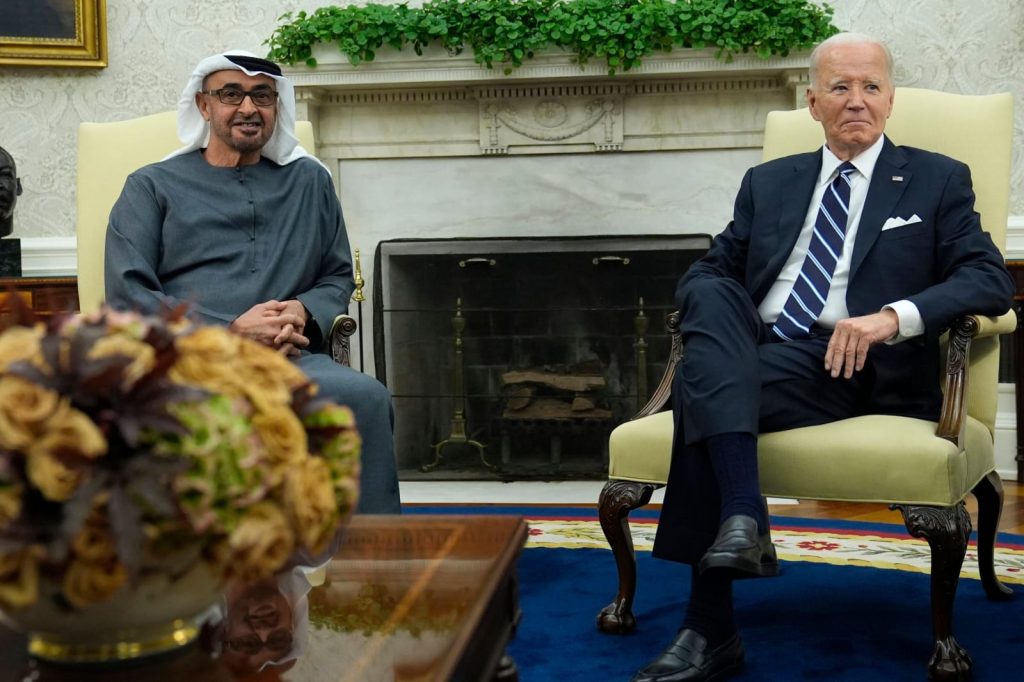The recent partnership between the United Arab Emirates (UAE) and the United States marks a pivotal development in the ongoing technological rivalry between the US and China. This collaboration underscores the complex geopolitical landscape smaller nations navigate as they pursue technological advancement and economic growth. While the long-term implications remain uncertain, it signifies a new chapter in the UAE’s technological strategy and international relations.
Following months of American pressure to withdraw investments from Chinese technology firms, the UAE has formally aligned itself with the US to lead global advancements in artificial intelligence (AI). This agreement was solidified last Monday when the national security advisers of both countries endorsed “common principles for cooperation on AI” during a meeting in Washington, DC. The agreement stipulates that state-owned Emirati tech companies will avoid partnerships with Chinese AI firms flagged by the US for national security concerns. However, analysts suggest that collaboration with Chinese companies may persist in politically neutral sectors such as renewable energy.

The AI partnership emerged as a focal point during President Joe Biden’s discussions on September 23 with Emirati President Sheikh Mohammed bin Zayed Al Nahyan. Biden emphasized this pact, along with strengthened defense ties and mutual interests in conflict prevention and de-escalation, as grounds for recognizing the UAE as a “major defense partner.” This designation will enhance military cooperation, interoperability, and advanced weapons transfers between the two nations—an honor previously granted to India, a key ally in strategic alliances like the Quadrilateral Security Dialogue with Australia and Japan.
In a joint statement following the presidential meeting, the US and UAE expressed their intent to “strengthen cooperation, develop regulatory frameworks,” and promote the safe deployment of emerging technologies based on their shared AI principles. This partnership builds on a quid pro quo established in February, when Abu Dhabi’s state-owned AI holding company, G42, divested from Chinese tech firms to secure access to critical US technologies, including Nvidia chips. The US has restricted sales of such chips to the Middle East as part of its national security review.
G42 previously held an estimated $100 million investment in ByteDance, the parent company of TikTok, which the US could potentially ban under a controversial law aimed at forcing the Chinese firm to divest the platform. The company also collaborated with the Chinese AI firm BGI Genomics—blacklisted by the US in 2021 as a Chinese military venture—on biotechnology projects, including efforts to trace the COVID-19 virus during the pandemic. After divesting from China, US tech giant Microsoft acquired a $1.5 billion stake in G42, aiming to develop and deploy advanced AI and digital infrastructure across the Middle East, Central Asia, and Africa.

The Microsoft-G42 partnership recently launched a project leveraging 1 gigawatt (GW) of geothermal energy to power data centers in Kenya, designated by the US as its first “major non-NATO ally” in sub-Saharan Africa. During a June speech at the Council on Foreign Relations in New York, White House technology adviser Tarun Chhabra noted that the Microsoft partnership with G42 was part of broader US efforts to prevent Middle Eastern states from collaborating with China’s Huawei on AI development. “The effort to work with Microsoft as an alternative to Huawei is a positive development that we want to encourage,” Chhabra stated.
Despite US pressure, the UAE has shown resistance to ceasing business with Huawei, which installed the country’s 5G infrastructure in 2019. Tensions escalated over American allegations that China was building an intelligence facility at a container terminal operated by Cosco Shipping Ports in Abu Dhabi, claims the UAE dismissed as unfounded following an investigation. This friction led to the UAE pulling out of talks for a $23 billion deal to acquire US F-35 stealth warplanes and MQ-9 Reaper drones.
As part of its ambition to become a significant player in the technology sector, the UAE plans to establish AI data centers across Asia, including in India, Indonesia, Malaysia, and the Philippines. On September 18, G42 announced plans to build AI data centers in India with a dedicated power generation capacity of up to 2 GW—double the country’s current installed capacity—and deploy a powerful supercomputer. On the same day, Abu Dhabi’s global technology investment firm, MGX—partly owned by G42—joined the Global AI Infrastructure Investment Partnership, a consortium that includes leading US corporations such as Microsoft, BlackRock, and Global Infrastructure Partners. This consortium aims to invest up to $100 billion in AI data centers and supporting energy infrastructure, leveraging Nvidia’s expertise, with short-term plans to raise $30 billion in private equity.
However, experts caution against viewing the newly announced AI partnership between Abu Dhabi and Washington as the UAE’s alignment with the US-led chips and AI coalition that includes Japan and South Korea. Ahmed Aboudouh, head of China studies research at the Emirates Policy Centre in Abu Dhabi, stated, “I don’t think the Emirati leadership is interested in putting the UAE in this position.” Instead, he believes Abu Dhabi is pursuing its own path, focused on maximizing self-interest by developing its industrial and tech sectors to position itself as a major tech power in the future. “The UAE has a vision to be the Taiwan of the Global South when it comes to tech power,” Aboudouh noted.
Despite this strategic pivot, he doesn’t foresee the UAE abandoning its AI collaboration with China entirely. The UAE’s long-term priority is to diversify its technological partnerships, ensuring its development is not overly reliant on any single nation. “Think of it as a tech hedging strategy,” he added.
Robert Mogielnicki, a senior resident scholar at the Arab Gulf States Institute in Washington, remarked that the US-UAE plan to deepen AI cooperation reflects the UAE’s ambitious technology goals and the expertise the US brings to the table. He emphasized that while US-China competition in technology persists, both countries offer different types of partnerships in the Middle East, Africa, and Central Asia.
The UAE’s decision to embrace a new AI partnership with the US, distancing itself from Chinese technology, represents a significant shift in its tech alliances and geopolitical strategy. This partnership aims to promote international AI standards, align regulatory frameworks, and encourage ethical AI research and development. The collaboration also emphasizes cybersecurity and aims to facilitate bilateral investment in AI infrastructure.
Both nations are committed to supporting talent development and exchange in the AI sector, with the UAE seeking access to cutting-edge US technology and expertise. This partnership aligns with the UAE’s efforts to establish itself as a leader in AI, following its historic move in 2017 to appoint a Minister of State for Artificial Intelligence.

While the UAE’s AI sector has experienced substantial growth, analysts predict that it will maintain a balanced approach, continuing collaborations with Chinese firms in politically neutral areas like renewable energy and infrastructure projects. This strategy reflects the UAE’s desire to foster positive relations with both global powers while pursuing its technological ambitions. By 2023, the UAE had established 54 startup companies in the energy sector, with 21 focused on renewables and 12 on energy storage. In the first half of 2024, UAE energy startups secured $30 million in funding, surpassing the previous year’s total.
In summary, the newly formed partnership between the UAE and the US represents a significant evolution in the UAE’s tech strategy and its approach to international relations, aiming to balance cooperation with both the US and China as it seeks to enhance its role in the global technology landscape.
Copyright©dhaka.ai
tags: Artificial Intelligence, Ai, Dhaka Ai, Ai In Bangladesh, Ai In Dhaka, Future of AI, Artificial Intelligence in Bangladesh, UAE



